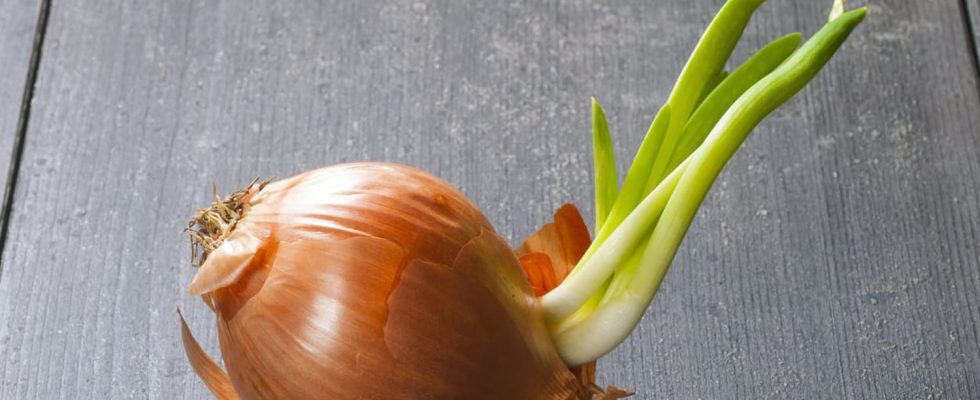You only have one onion left but has it sprouted? Can we eat it without problem? Yes in most cases but there is one thing to avoid.
You know that savory, fragrant aroma that fills the room when you start making dinner? Most often, we owe this to onions. Onions, or any type of allium for that matter, are the easiest way to build a base of flavor in a recipe. They’re also incredibly versatile: you can slowly caramelize their natural sugars, marinate them in a tangy brine, or fry them into a crunchy topping; a green bean gratin just wouldn’t be the same without them.
Onions are also an extremely robust vegetable. When stored properly, some varieties of onions can last up to several months. But even with the most careful storage techniques, you can sometimes end up with a sprouted onion.
Sprouts can often indicate that a vegetable is past its prime. And in the case of certain types of produce, such as potatoes, this may even mean that it is no longer completely safe to consume them. But what do sprouts mean when it comes to onions?
Germination is a natural stage of the onion life cycle. They are considered a root vegetable in the culinary world, but botanically, they are technically a bulb. And just like other bulbs (including flowers), onions are essentially the resting phase for a mature onion plant.
Germination begins when the onion is exposed to the right growing conditions. It doesn’t necessarily need to be in the ground for this to happen. When stored in warm, humid, and/or lighted areas, onions are essentially tricked into thinking it is spring and begin the germination process.
Unlike potatoes, where the mature plant is toxic to humans, all parts of the onion are edible. So you don’t have to worry when you see green shoots coming out of your produce. In fact, you don’t even need to take them off. Onion sprouts aren’t the same as chives or green onions, but they taste pretty similar. So don’t hesitate to chop them and use them in your recipes.
Sprouted onions are generally safe to consume, but there are still a few important things to know. To provide enough nutrients for sprout growth, the onion uses the sugars naturally present in the bulb. This will gradually deplete the tangy sweetness found in a fresh onion. If you cook the onions, it shouldn’t make much difference. But it is recommended not to use sprouted onions in raw preparations, since the onions will have a more astringent taste. And it goes without saying that you should throw away (or compost!) your sprouted onions if they’re limp, oozing juice, or developing mold.
The most obvious method to prevent your onions from sprouting is to eat them soon after purchasing them. But for those of us who buy onions in large quantities, you can slow germination with proper storage. Avoid keeping your onions in areas with high humidity and temperature levels. Normally, you can store your onions in a dark room like a pantry or cupboard. But if it’s high summer and you live in a more humid environment, it’s best to keep them in the refrigerator.
